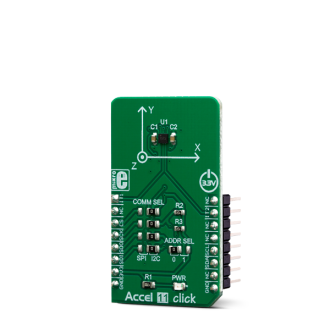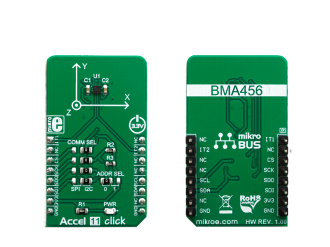
We strongly encourage users to use Package manager for sharing their code on Libstock website, because it boosts your efficiency and leaves the end user with no room for error. [more info]

Rating:
Author: MIKROE
Last Updated: 2019-04-09
Package Version: 1.0.0.0
mikroSDK Library: 1.0.0.0
Category: Motion
Downloaded: 5400 times
Not followed.
License: MIT license
Accel 11 click features an ultra-low power triaxial accelerometer sensor with embedded intelligence, labeled as the BMA456.
Do you want to subscribe in order to receive notifications regarding "Accel 11 click" changes.
Do you want to unsubscribe in order to stop receiving notifications regarding "Accel 11 click" changes.
Do you want to report abuse regarding "Accel 11 click".


Library Description
The library initializes and defines the I2C bus driver and drivers that offer a choice for writing data in register. The library includes function for read X/Y/Z axis data and function for read Temperature of the chip. The user also has the function for software reset and function for power on module.
Key functions:
void accel11_softwareReset() - Software reset.void accel11_powerOnProcedure() - Power On Procedure.int16_t accel11_getAxisData(uint8_t axis) - Accel Axis data.Examples description
The application is composed of the three sections :
void applicationTask()
{
char demoBuffer[ 50 ];
int16_t X_axis;
int16_t Y_axis;
int16_t Z_axis;
X_axis = accel11_getAxisData(_ACCEL11_ACCEL_X_AXIS);
IntToStr(X_axis, demoBuffer);
mikrobus_logWrite(" X axis : ", _LOG_TEXT);
mikrobus_logWrite(demoBuffer, _LOG_LINE);
Y_axis = accel11_getAxisData(_ACCEL11_ACCEL_Y_AXIS);
IntToStr(Y_axis, demoBuffer);
mikrobus_logWrite(" Y axis : ", _LOG_TEXT);
mikrobus_logWrite(demoBuffer, _LOG_LINE);
Z_axis = accel11_getAxisData(_ACCEL11_ACCEL_Z_AXIS);
IntToStr(Z_axis, demoBuffer);
mikrobus_logWrite(" Z axis : ", _LOG_TEXT);
mikrobus_logWrite(demoBuffer, _LOG_LINE);
mikrobus_logWrite("---------------------------------", _LOG_LINE);
Delay_ms( 1500 );
}
Other mikroE Libraries used in the example:
I2CUARTConversionsAdditional notes and informations
Depending on the development board you are using, you may need USB UART click, USB UART 2 click or RS232 click to connect to your PC, for development systems with no UART to USB interface available on the board. The terminal available in all MikroElektronika compilers, or any other terminal application of your choice, can be used to read the message.
Library Description
The library initializes and defines the I2C bus driver and drivers that offer a choice for writing data in register. The library includes function for read X/Y/Z axis data and function for read Temperature of the chip. The user also has the function for software reset and function for power on module.
Key functions:
void accel11_softwareReset() - Software reset.void accel11_powerOnProcedure() - Power On Procedure.int16_t accel11_getAxisData(uint8_t axis) - Accel Axis data.Examples description
The application is composed of the three sections :
void applicationTask()
{
char demoBuffer[ 50 ];
int16_t X_axis;
int16_t Y_axis;
int16_t Z_axis;
X_axis = accel11_getAxisData(_ACCEL11_ACCEL_X_AXIS);
IntToStr(X_axis, demoBuffer);
mikrobus_logWrite(" X axis : ", _LOG_TEXT);
mikrobus_logWrite(demoBuffer, _LOG_LINE);
Y_axis = accel11_getAxisData(_ACCEL11_ACCEL_Y_AXIS);
IntToStr(Y_axis, demoBuffer);
mikrobus_logWrite(" Y axis : ", _LOG_TEXT);
mikrobus_logWrite(demoBuffer, _LOG_LINE);
Z_axis = accel11_getAxisData(_ACCEL11_ACCEL_Z_AXIS);
IntToStr(Z_axis, demoBuffer);
mikrobus_logWrite(" Z axis : ", _LOG_TEXT);
mikrobus_logWrite(demoBuffer, _LOG_LINE);
mikrobus_logWrite("---------------------------------", _LOG_LINE);
Delay_ms( 1500 );
}
Other mikroE Libraries used in the example:
I2CUARTConversionsAdditional notes and informations
Depending on the development board you are using, you may need USB UART click, USB UART 2 click or RS232 click to connect to your PC, for development systems with no UART to USB interface available on the board. The terminal available in all MikroElektronika compilers, or any other terminal application of your choice, can be used to read the message.